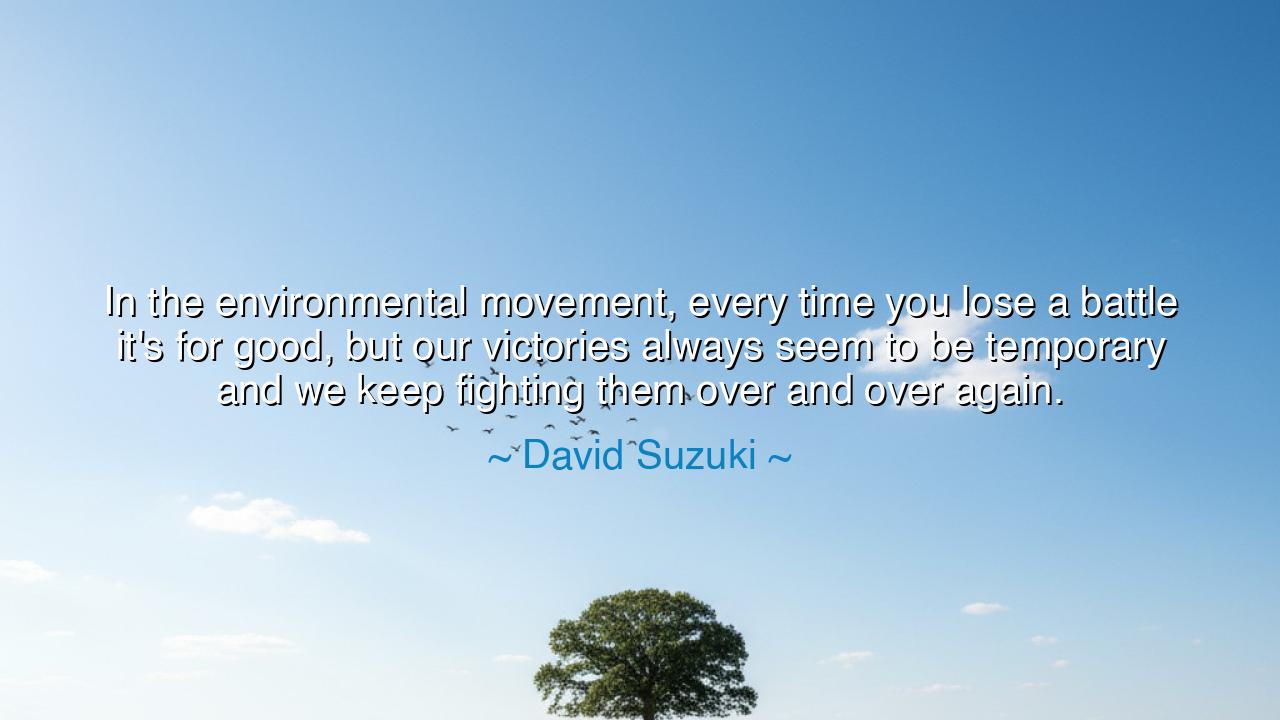
In the environmental movement, every time you lose a battle it's
In the environmental movement, every time you lose a battle it's for good, but our victories always seem to be temporary and we keep fighting them over and over again.






Hear the seasoned watchman speak from the ramparts: “In the environmental movement, every time you lose a battle it’s for good, but our victories always seem to be temporary and we keep fighting them over and over again.” In this hard saying, David Suzuki names the asymmetry of our age: destruction is swift and lasting; preservation is fragile and must be renewed. A forest cut is a century gone; a species lost is a silence without echo; a river poisoned forgets its former name. Yet a park declared can be undeclared, a safeguard repealed, a treaty unstitched by a pen at dusk. The sword of harm bites once and leaves a scar; the shield of care must be lifted every morning.
The elders would understand. They taught that a house can burn in an hour, but is built in many winters; that a reputation is lost by a single folly, but earned by a thousand faithful acts. So it is with the green commons. One careless mine tailings pond, one leaky pipeline, one clear-cut on a steep slope—and the hill slides, the lake suffocates, the salmon do not return. Such losses are for good not because we desire it, but because time itself is on their side. But when we win—a moratorium, a reserve, a standard—it is a tent in a shifting wind, a covenant that must be renewed with each generation.
Mark a tale to carry near the heart. An ancient valley stood whole for centuries, its cedars braced like columns of a temple. Activists rallied; courts listened; the bulldozers turned away and the maps grew green. For a time. Years later, a new petition, a new loophole, a new hunger for short-term coin, and the lines on the map began to tremble. The valley still stands because the people stood again. This is the rhythm Suzuki laments and yet affirms: victories that are temporary, requiring the same courage as the first day—requiring us to keep fighting without bitterness and without rest.
Look also upon the ledger of rivers. A city cleans its waterway; fish return; cafes bloom along a reborn quay. But upriver, permits shift; fertilizers swell; a factory forgets its promise, and the old foam gathers like a bad memory. The cleanup was real, the joy was real—yet maintenance is a second art as noble as rescue. The Dane who paints his fence each spring honors the fence; the citizen who paints the law each session honors the river. We do not apologize for repainting; we call it stewardship.
Why is this so? Because extraction compresses time: it cashes yesterday and tomorrow into today. Restoration expands time: it pays forward with patience, with interest that only grandchildren can draw. The environmental movement lives inside this moral physics. It must learn the art of the marathon while the market trains for sprints. To despair is easy; to endure is holy. The work asks that we make a festival of persistence, that we teach our children to love repeating the good as much as others love repeating the profitable.
Let the lesson be written plain: build institutions, not only moments; weave law with culture, culture with habit. Protect what you can and then protect the protection. Make it expensive to forget. A victory that cannot be re-won is a myth; a victory that can be re-won is a craft. We must learn that craft until it is muscle memory—letters to councils, votes counted, budgets scrutinized, watchdogs funded, science translated into stories that move the common heart.
And now, the path beneath our feet: (1) Anchor every win in statute, budget, and local pride—so undoing it angers not just activists but neighbors. (2) Pair parks with livelihoods—rangers paid, guides trained, restoration crews hired—so protection makes sense to the village ledger. (3) Maintain citizen routines—water testing clubs, air monitors, tree-planting and tree-counting—so data outlives administrations. (4) Train successors—youth councils, school partnerships—so memory does not lapse when elders tire. (5) Tell the old stories yearly—the river that burned, the forest that stood—so forgetting feels like betrayal. Do these things, steadily, and when we lose a battle it will be rare; when we win, though the victory be temporary, we will meet the next morning with the same faithful hands and lift the shield again—until the habit of care becomes the custom of a people, and the long defeat bends, at last, toward a long deliverance.






AAdministratorAdministrator
Welcome, honored guests. Please leave a comment, we will respond soon